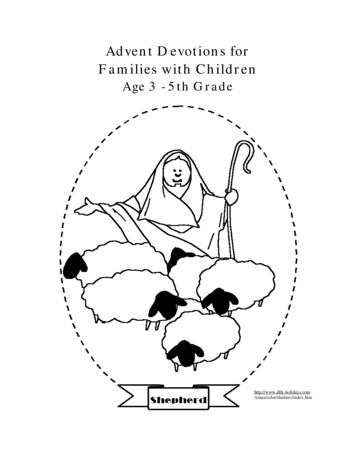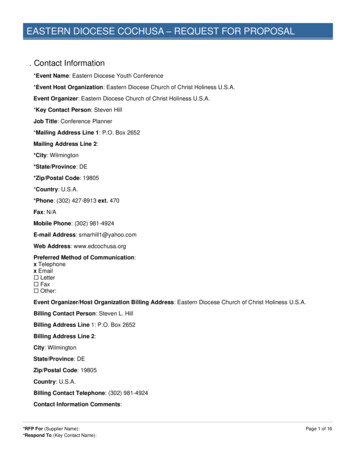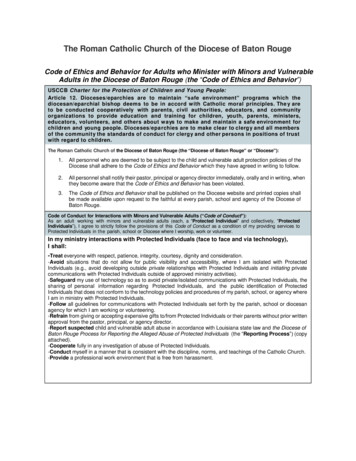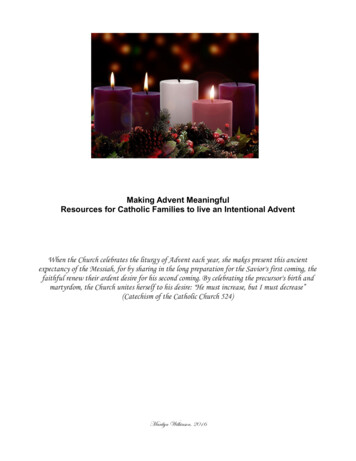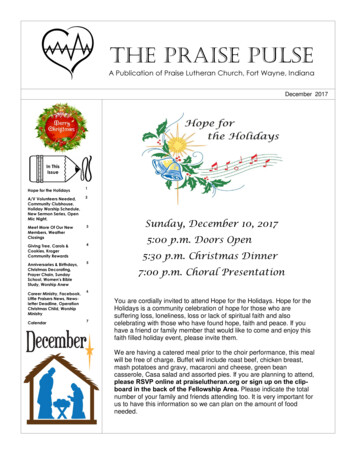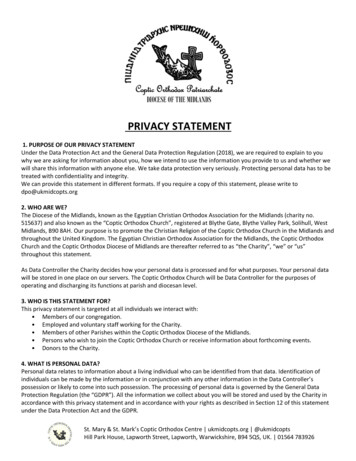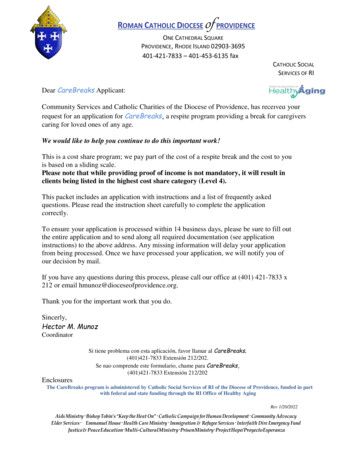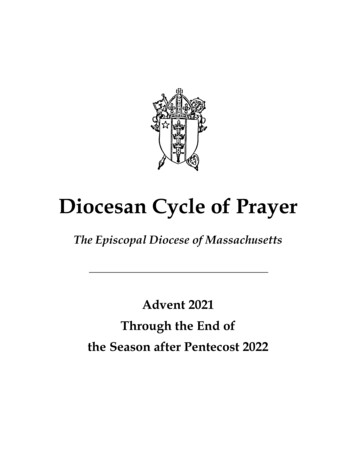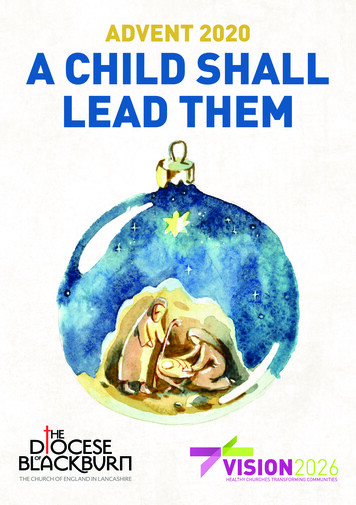
Transcription
ADVENT 2020A CHILD SHALLLEAD THEM
INTRODUCTION“The celebration of advent is possible only to those who are troubled in soul, who knowthemselves to be poor and imperfect, and who look forward to something greater to come.”Dietrich BonhoefferWEEK 1 SUNDAY 29TH NOVEMBERTHE FIRST SUNDAY OF ADVENTREADING: ISAIAH 1:1-8Whatever we make of Bonhoeffer’s statement, without a doubt, 2020 has left pretty much all ofus longing for better times ahead. Now, we may be thinking of a post-COVID day, but that day(wonderful as it will be) pales in comparison to the ‘something greater’ that the Bible refers to.‘The vision concerning Judah and Jerusalem that Isaiah son of Amoz saw during the reignsof Uzziah, Jotham, Ahaz and Hezekiah, kings of Judah. ‘Hear me, you heavens! Listen,earth! For the Lord has spoken’’. Isaiah 1.1-2aIn these Advent daily readings, we will be seeing the season through the eyes of Isaiah, writingto the people of Israel who for fifty years had been in forced exile from their homeland. In hisprophecy, at last, Isaiah brings a word of hope to this despondent and disheartened people. It’sa promise of God’s servant who will come to bring justice to the world, and into the darkness ofexile, light.My eyesight is terrible. Many years ago I dived into the shallow end of a swimming pool becauseI was unable to see the warning written in huge 50cm high letters. Fortunately, I dived shallowlyand so only scraped my chest on the bottom of the pool. These days I swim with prescriptiongoggles and I regularly get my eyes tested to make sure I can see clearly.However, as we will discover, this servant is to take on a surprising form, exposing the dreamers’most wild imaginings as simply not wild enough. The long awaited Messiah would not arriveas a great warrior king as they had perhaps anticipated, but a baby, born in the humblest ofcircumstances, a child who would lead people of all nations into the glorious freedom andeverlasting joy that is found in the kingdom of God.We will see that from the earliest promise of His coming, to the angelic announcement of Hisbirth in a field outside of Bethlehem, the hope of the world is Jesus, the Son of God given torescue and redeem a broken and weary world.However, these words of Isaiah are not merely a prophecy of the coming Christ. God, through theprophet Isaiah, is also challenging the people of God both then and now. The challenge to thepeople of Isaiah’s time was to hear in this prophecy the call to them, as God’s people, to be thosewho would be the bearers of justice to the world, bringing peace and hope to their communities.Today we, as God’s people the Church, pick up that mantle and receive that same challenge tobring God’s hope to the world.Our prayer this Advent is that amidst the challenges we face, we too would know the certaintyof God’s promise fulfilled in Jesus, the Messiah, and respond to His call to be those hope-filledpeople, who will bring light and life to a hurting world - that we would be led by the Christ-childas we prepare for his coming.May God bless you richly this Advent.Just like physical eyesight, my spiritual eyesight needs help so that I can see the world more asGod sees it. My spiritual vision was massively restored when I committed to following Jesus butall these years later, I still need to stop and get it refocused from time to time. That’s why thetwin seasons of Advent and Lent are so important. These times of stopping, stripping away someof the things that I fill my life with and refocusing on the purposes of God help me to see moreclearly once again.This year’s Advent reflections are touring through the book of Isaiah which opens with Isaiahbeing given a vision of how God sees things. It’s a disturbing picture of loved and nurturedchildren ignoring the warning signs and going astray, turning their back on God and givingthemselves to evil with disastrous consequences. The Lord’s beloved children have gone so faroff the rails that they get compared to the people of Sodom and Gomorrah – a common biblicalimage for all consuming sin. Yet the passage is not without hope and by verse sixteen theLord appeals to his children to clean up their act, to abandon their sinful ways for with him it ispossible for scarlet sins to be white as snow.This Advent we invite you to stop and take stock. To seize the opportunity to have your visionrestored once more by simply asking the Lord to let you see what is coming between you andhim. Listen closely to the prompting of his Spirit and allow him to let you see your life as he seesit. Remember, there is no need to be afraid of what he shows you for by his power he can setyou free from the sins that have crept into your life. However scarlet they may be, through thecleansing power of Jesus you can be white as snow and you too can see more clearly once again.The Revd Nick McKee, Director of VocationsRuth Hassall, Director of Discipleship23
WEEK 1MONDAY 30TH NOVEMBERTUESDAY 1ST DECEMBERWEEK 1READING: ISAIAH 2:1-5READING: ISAIAH 4:2-6‘Come, let us walk in the light of the Lord’ Isaiah 2:5‘On that day the branch of the Lord shall be beautiful and glorious, and the fruit of theland shall be the pride and glory of the survivors of Israel.’ Isaiah 4:2I wonder what your response would be to the question, “If you could change one thing aboutthe world, what would it be?” If you were watching Miss World or a film about a beauty pageant,you’d expect the participants to say something about world peace. Then you would probablyroll your eyes at the cliché. But why? Because in our hearts we believe that it will never be. Worldpeace? That’s far too big a thing to hope for, isn’t it?Yet Isaiah’s word to Israel and Judah is just that. There is hope.The vision he shares is for a world in which all nations will come to God; not only Israel andJudah, but gentiles too. The vision is for a just world. Wrongs aren’t swept under the carpet andforgotten, but righteousness and justice are in charge. What wasmade to destroy is repurposed into something made to create. Inthis utopia, there is no need for violence anymore.The vision is for aShane Claiborne, a Christian activist and author, campaigns(among other things) for more restrictive gun laws in America.He is an advocate for RAWtools, an organisation, quite literally,turning weapons into garden tools. Taking inspiration from Isaiah2:4, they take assault weapons, rifles, hand guns, knives andby melting them down, they forge them into something useful.The vision of a world at peace still seems far off, but one weaponat a time, RAWtools is helping create a world where peace is apossibility.just world. Wrongsaren’t swept underthe carpet andforgotten, butrighteousnessand justice are incharge.Living in this imperfect world, stuck between the Kingdom of God both present and yet to come,we can be assured of a future where death will be no more and all tears are wiped away (Rev 21:4).We can look forward with future hope to a time and place where death is turned into life. Deathhas been defeated.In Hampton Court, near London, there’s a grapevine that’s estimated to be 1,000 years old. Thisgrapevine has 1 single stem that’s almost 2 feet thick. Despite its age the vine produces morethan 2 tonnes of grapes each year. Even though some of the branches are 200 feet from the mainstem, they still bear the sweet and delicious fruit because they’re connected to the vine. Life flowsthroughout the vine from that single root, bringing nourishment and strength to each of thebranches.Jesus promises to do the same through and for us. He’s the true vine, bringing life in order that wemight produce lasting spiritual fruit. When separated from the vine, we wither. The vitality of ourspiritual life is dependent upon our connection to our root – Christ.It was Saint Augustine who said that ‘the New is in the Old concealed, the Old is in the Newrevealed’. All the pages of Scripture are soaked with references to Jesus and today’s passage is noexception. Modern scholars understand this verse to be about the Messiah.This language of branches and fruit is echoed in John’s Gospel. Elsewhere in the Old Testamentwe read of how King David described God’s promise to give him an offspring that would rule foreternity. Of course David didn’t have the full understanding we have, for we’re able to look back inretrospect and see more clearly. Through the shadow of the incarnation we see that Messiah didcome from David’s seed, through a young Jewish maiden named Mary.The life of the Branch will also flow through believers and bear spiritual fruit. In John 15:4–5 weread these verses from Jesus: ‘Abide in me as I abide in you. Just as the branch cannot bear fruit by itselfunless it abides in the vine, neither can you unless you abide in me. I am the vine, you are the branches. Thosewho abide in me and I in them bear much fruit, because apart from me you can do nothing.’And as we await the coming Kingdom, ‘Come, let us walk in the light of the Lord.’ Because when wewalk in the light of Christ, we bring the Prince of Peace into the world with us.We notice that God wants us to bear much fruit, meaning that he’s not satisfied with some ormore. He wants much. Just like the branch of a vine or a tree, you and I are connected to our vine,Jesus Christ. May we take the opportunity this Advent to establish deep roots with the Lord –allowing him to lead us in our daily lives – in order that we may bear much fruit for him.The Revd Emma Swarbrick, Assistant Curate, St. Thomas’, BlackpoolLORD, please keep us closely connected to you this day, in Jesus’ name we pray.The Revd David Craven, Parish Priest, St George’s, Preston45
WEEK 1THURSDAY 3RD DECEMBERWEDNESDAY 2ND DECEMBERWEEK 1READING: ISAIAH 5:1-7READING: ISAIAH 16:1-5‘I will make it a waste [ ] I will also command the clouds that they rain no rain upon it [ ]he expected justice, but saw bloodshed; righteousness, but heard a cry!’ Isaiah 5:6-7‘ a throne shall be established and on it shall sit in faithfulness a ruler who seeks justiceand is swift to do what is right.’ Isaiah 16:4c-5A Happy StoryI have a fig tree in my garden (not quite a vine I know but bear with me). It looked almost deadwhen I planted it, just a dry stick, fit to throw away but with feeding and care it has flourished. Iget a childlike pleasure in watching the figs grow, it’s the first thing I check when I go into thegarden – how are they doing, any new signs of figs today? Yes, I know I can go to Aldi, but myhome-grown figs really are the best! I get excited looking for fruit on my fig tree.For a while back in 2015, the refugee crisis precipitated by civil war in Syria dominated the news.Many of us have the tragic image of three-year-old Alan Kurdi, drowned on a Turkish beach, foreveretched into our consciousness. And yet, we have since all but forgotten the 65m or more displacedpersons around the world, as other matters displaced their plight from our horizons.A Sad StoryIsaiah 5:1-7 tells us that God planted his people as a vine. Hetended it carefully and looked expectantly for fruit - but therewas no good fruit, just wild grapes. God has a right to expectfruit from his vine and we hear his sense of injustice when hefinds bad fruit. And who can judge him in the course of action henow intends ‘I will make it a waste I will also command the cloudsthat they rain no rain upon it’ (v6). Who can blame him - ‘he expectedjustice, but saw bloodshed; righteousness, but heard a cry!’ (v7).The question todayis what sort of vineare you? What sortof vine are we asGod’s church?A QuestionThe question today is what sort of vine are you? What sort of vine are we as God’s church?God hasn’t changed, he expects fruit of righteousness and justice, from his church today andfrom your life. What sort of fruit are you yielding? Take time today to look at your life, ask forforgiveness where you need to, seek God the master gardener’s help to change and bear the fruitwhich delights his heart.A Peek of HopeAdvent invites us to look for the coming of Christ in new ways into our lives. Ultimately this sadstory and even our prayers for change only find their joyful fulfilment in Christ himself. Hearagain that great cry of Jesus, ‘I am the True Vine those who abide in me and I in them bear much fruit’John 15:1,5.The Revd Sue Timmins, Vicar of All Saints, Appley Bridge & Christ Church, ParboldIsaiah 16:1-5 comes amidst an oracle foretelling an Assyrian invasion of Israel’s neighbour andhistorical foe, Moab. Isaiah imagines the Moabite command desperately petitioning Jerusalem toreceive Moab into vassal status (v1). The women had already recognised what the commandersnow, perhaps reluctantly, were conceding: their only hope lay in fording the Arnon river into theLORD’s dominion (v2), trusting God’s people to keep his Law concerning receiving and caring forrefugees (e.g. Leviticus 19:33-34). In this, they resembled the most famous Moabitetess, Ruth, wholikewise sought refuge under the wings of the LORD God of Israel (Ruth 2:12), later to become greatgrandmother to King David.The Moabites seek the protective ‘shade’ of Judah from the noonday heat of their Assyrian oppressor(vv3-4). But the prophecy goes on to reveal that the Moabites’ looking to Judah for refuge is not onlya temporary political expedient, but an everlasting, spiritual orientation. Crises come and crises go;but those who seek counsel and justice, refuge and security (vv3a-4b) will ultimately find it only inthe coming reign of the Messiah, a king in the line of (one-eighth Moabite) David. Messiah’s eternalrule of faithfulness, justice, and righteousness (v5) will extend to all who flee to him for mercy andsafety – even gentile, former enemy, refugees.We live in-between Christ’s two Advents: the kingdom has come (Jesus already occupies the throneof David); but the kingdom is not yet fully come (which is why we pray it might) until his return. IfIsrael were instructed in the Law how to provide generously for asylum-seekers; and if the comingmessianic age was linked in Isaiah’s prophecy to the reception of refugees from the nation’s mostbitter enemies; then how much more should the Church be a bastion of compassion, hospitality,and justice for refugees and other desperate migrants?Advent is a season of penitence and hope. From Isaiah 16:1-5, may we repent for our indifference toand neglect of refugees; and may they and we together find hope in the full coming of the reign ofJesus Christ – himself, lest we forget, like Alan Kurdi, a childhood refugee.The Revd Dr Tom Woolford, Vicar of All Saints, New Longton67
WEEK 1FRIDAY 4TH DECEMBERSATURDAY 5TH DECEMBERWEEK 1READING: ISAIAH 19:16-24READING: ISAIAH 21:6-12‘On that day there will be an altar to the Lord in the centre of the land of Egypt, and a pillarto the Lord at its border. It will be a sign and a witness to the Lord of hosts in the land ofEgypt; when they cry to the Lord because of oppressors, he will send them a saviour, andwill defend and deliver them.’ Isaiah 19:19-20‘For thus the Lord said to me: ‘Go, post a lookout, let him announce what he sees. When hesees riders, horsemen in pairs, riders on donkeys, riders on camels, let him listen diligently,very diligently.’ Isaiah 21:6-7In Advent, we look forward to the coming of the Lord at Christmas, to the Second coming, and tothe Lord’s coming to each of us.This passage tells us what will happen ‘in that day’, focusing at first on the terror and the fear. Itthen continues, telling us another three times what happens ‘in that day’. It may be a differentday, or it may be the same day, remembering that to the Lord a thousand days are as the blink ofan eye. Maybe all the different reactions don’t happen in an orderly fashion one after the other,but are there all together, some experiencing one thing, and some another, some more than oneemotion at the same time. We see that in our Christmas story, and perhaps we recognise it forourselves.As I read this passage over again, I begin to see myself as Egypt, begin to see that in that day,when the Lord comes to me, I am terrified, and yet I hear what God is saying to me, I worship, andabove all I cry out to be rescued from whatever or whoever is oppressing me. and I am rescued,I am healed. I am able to be at peace, to make peace with my neighbours, and be a blessing toothers, as the Lord has blessed me.Looking again at that passage, there is a suggestion that this is happening again and again withEgypt, as with Israel, as with each of us, as our relationship with God changes and deepens. Asuggestion that as we construct what become those patterns of worship, as we search for orderso that we can ‘understand’ God, and as we wander away on our own path, God is constantlydisrupting our life so that we will again turn to the Lord and be healed.As I read the passage yet again, I am led to understand that what is important is that in thecentre of my life, there is an altar to the Lord. What is important is that my life is dedicated, aswith a pillar or a monument, to the God we worship. Then, instead of trembling with fear, I will betrembling with awe as I come to know, to the full, all the blessings that the Lord wants to showeron me in that day of the Lord’s coming.The Revd Lesley Prest, Vicar, St Anne, Greenlands and St Paul, Blackpool North ShoreMost people have heard of, and many have read, the Pulitzer Prize-winning novel by Harper Lee, ToKill a Mockingbird. Published in 1960, it has become a classic of modern American literature. Theplot is loosely based on the author’s recollections of her family and neighbours, and of an eventwhich occurred near her home of Monroeville, Alabama, in 1936, when she was ten. The novel dealswith the serious issues of rape and racial inequality; and its main character, Atticus Finch, emergesas an image of racial heroism.In 2014, another novel by Harper Lee was discovered and subsequently published the following yearas a sequel to her famous classic. In fact, it has become clear that this work, Go, Set a Watchman wasin fact a first draft of the prize-winner, written in the mid-1950s. Its title comes from the openingof today’s passage: ‘For the Lord said to me: “Go, set a watchman, let him announce what he sees”’ (Isaiah21:6). Lee grew up in a Bible-reading family and the title would still find a resonance with many inAmerica’s southern states. The lawyer Atticus Finch is Lee’s watchman and moral arbiter.Isaiah was a prophet in the Kingdom of Judah, probably between 742 and 701BCE and, here, heis prophesying about the fall of Babylon. The historian Wayne Flynt has suggested that HarperLee likened Monroeville (‘Maycomb’ in the novel) to Babylon, ‘the Babylon of immoral voices, thehypocrisy’. Flynt adds: ‘Somebody needs to be set as the watchman to identify what needs to bedone to get out of the mess’. Babylon’s idols couldn’t save her (v.9); and Babylon’s fall is consolingnews to a Judah that had suffered much under her.Dumah (and Kedar) descended from Ishmael (Genesis 25:13-14). Dumah is an oasis in Arabia. Seiris a mountain in Edom, and sometimes used as a metonym (substitute) for it The meaning of theseverses (11,12) is uncertain, but it seems that to a ‘watchman’ (i.e. a prophet) in Judah there comesfrom Dumah (therefore, from the East, the direction of Seir) an interrogation concerning ‘the night’– this may refer to a period of trial, perhaps of the Babylonian domination. The response (v.12)suggests a temporary relief only but, encouragingly, leaves the door open to future hope.‘We are pursuing a future, not a present, glory.Waiting and patience are necessary if we are to fulfil what wehave begun to be, and to receive, through God’s unfailing help, what we hope for and believe.’ - St Cyprian.The Revd Canon Stephen Jones, Parish Priest, Carnforth89
WEEK 2 SUNDAY 6TH DECEMBERTHE SECOND SUNDAY OF ADVENTREADING: ISAIAH 22:8-23‘I will place on his shoulder the key of the house of David.’ Isaiah 22:22This chapter is introduced as the prophet’s ‘oracle concerning the valley of vision’. Isaiah’s words dripwith painful irony as he implores the city of Mount Zion to see how low their sights are set. First, wesee the citizens of Jerusalem following an attack on the nation of Judah. Disaster had come to theirdoorstep. They have just survived a siege. They narrowly evaded invasion. Despite a late reprieve, thiswas their reproof. Yet, with wine and feasting, they climbed the terraces and hailed a partial defeatas a moral victory instead of mourning their moral failure. This should have been a moment to meetagain with God. But among the revellers on the rooftops, far from the mountaintop, long memoriesare in short supply.Lost in the valley, you can’t see the forest for the trees. They looked to the contents of Solomon’sarmoury yet ignored the wisdom which built it. They broke down houses to fortify the wall. Theychannelled static water to slake their thirst - as if all this were good enough to keep things bubblingalong. They forgot to remember the one on whom they depend. Low-level thinking and complacentself-sufficiency were symptoms of a destructive rejection of God. With no Defender there is nodefence and ‘He has taken away the covering of Judah’ (v8).In the second scene, tucked away in the palace, the big picture is seen in microcosm. There isShebna, the palace administrator who has taken advantage of his station to serve himself. Struttingaround the palace, he has sorely misjudged the security of his status. Shebna’s job will be takenaway and given to Eliakim. The words of the prophet point to the hope for all God’s people stuck inthe valley. Eliakim, God’s servant, is literally ‘the one raised up by God’.MONDAY 7TH DECEMBERWEEK 2READING: ISAIAH 24:1-18‘Now the Lord is about to lay waste the earth and make it desolate, and he will twist itssurface and scatter its inhabitants [ ] The earth lies polluted under its inhabitants; for theyhave transgressed laws, violated the statutes, broken the everlasting covenant.’ Isaiah 24:1,5It’s early December and you and probably many other people are beginning to think ofChristmas. It’s been a tough year . the shops are pushing their wares on us we really need thesethings, don’t we? It’s been a tough year . we really deserve to ‘let our hair down, don’t we? It’sbeen a tough year it’s time for some ‘me time!’ It’s been a toughyear . the words of these verses and our text are NOT what weLet us also takewant to hear today!We can look back on our world this year and remember thefloods that came not once but twice in some areas of our countryand caused great upheaval in our communities; the fires thatravaged Australia and America; strong hurricanes that whippedup the sea; the protests and civil disturbances here and abroadand of course the Coronavirus. What could be worse .time, to devotetime, today tolook at ourselvesand humbly comebefore our God. It istime to say sorry.Isaiah tells us it could be much, much worse. The Lord is ready tojudge the Earth. Our text is often referred to as Isaiah’s apocalypse. Verse 2 tells us that everyonewill be in the same boat, no one can escape or be immune from the things to come, not evenChristians. Our earth will wither the whole world languishes and even the heavens languish,both earth and heaven grow weak and are withering dying. Isaiah sees that the covenant withNoah (Genesis 9) has been broken and the world is cursed.This one who is coming will be clothed with the garments that match the authority given to him.Once again it will be clear that true government rests not on Temple or Palace, but on the House ofDavid. The one who is coming shoulders the key. Looking to the one raised up by God points the wayout of the valley and makes an open-and-shut case for self-sufficiency and self-importance. Insteadof breaking houses to raise walls, strongholds will be broken to build God’s House.Today most people are aware of how God wants us to live our lives, yet we, as a society and asindividuals are all guilty of transgressing his laws and violating his statutes. We pollute the earthnot just environmentally, but we pollute our world in the way we speak; the language we use;the way we behave; the crime and the violence. No one is exempt as we have become a selfishpeople and have strayed from the Way and the Truth. ‘Now the Lord is about to lay waste the earth’.Isaiah says the Lord is ready but hasn’t acted yet is there hope?I wonder how well I am reading the signs of what God is doing now? Do I recognise when I am in thevalley? How might I look beyond myself more to recognise and build upon the things of God whichwill last?Today let us take time to lay before the Lord all the many things our society does wrong and seekhis forgiveness. Let us also take time, to devote time, today to look at ourselves and humbly comebefore our God. It is time to say sorry.The Revd Matt Allen, Director of TrainingThe Revd Lesley Hinchcliffe, Vicar of St John’s, Higham and St Anne’s, Fence-in-Pendle.1011
WEEK 2TUESDAY 8TH DECEMBERWEDNESDAY 9TH DECEMBERWEEK 2READING: ISAIAH 25:1-5READING: ISAIAH 25:6-26:6‘O LORD, you are my God; I will exalt you, I will praise your name; for you have donewonderful things, plans formed of old, faithful and sure. For you have made the citya heap, the fortified city a ruin; the palace of aliens is a city no more, it will never berebuilt.’ Isaiah 25:1-2‘the Lord of hosts will make for all peoples a feast of rich food [ ] he will swallow up deathforever.’ Isaiah 25:6,8aWhat ‘wonderful things’ will you exalt God for today? Numerous things may spring to mind.However, I doubt that God’s destructive judgement would be top of the list. When was the lasttime you sang a song of praise to God for ‘ruining a city’? And yet this is precisely the theme ofIsaiah’s song. Isaiah praises God for his wonderful plans (literally: wonderful counsels, cf. Isa9:6) which are equated with ruining a foreign city with such devastation that it will never berebuilt. This city is not identified with any of Israel’s neighbouring enemies (cf. Isa 13-23), rather itrepresents every instantiation of the corruption, injustice, violence, and oppression of rebellioushumanity. It signifies the City of Man set up in proud defiance of the City of God. In short, this citystands for the evil of sin, the resultant reign of death, and the ruler of such a kingdom, Satan.What ‘wonderfulthings’ will youexalt God for today?Numerous thingsmay spring to mind.Isaiah praises God as he looks forward to a time when the stormsof such powers are stilled and no longer wreak havoc on the poorand needy (v.4). He looks forward to a time when the oppressiveheat of this mighty inferno no longer causes God’s people to faint(v.5). A time when these ruthless enemies of God are humbledand bow the knee before the LORD (v.3).Advent is a time when we look forward to our coming salvation,secured in Jesus’ first coming and completed in his secondcoming. But this also entails contemplating what we are saved from. Here in Isaiah we arereminded of the fact that for God’s city of life, peace and justice to triumph, the city of sin, deathand the devil must fall. Through his life, death and resurrection, Jesus has already disarmed theserulers and authorities and he has broken the power of sin and death. Now we await his secondcoming when he will finally put an end to all evil and opposition against God.As we sing for joy over our future salvation and as we pray, ‘come, Lord Jesus’, we are at the sametime, necessarily praying ‘make the city a heap, the fortified city a ruin.’ As we dwell on that realitytoday, let us learn to rejoice in the fact that this city that causes so much harm and sadness willfinally be destroyed. and never be rebuilt.The Revd Andrew Meeson, Vicar of St John’s, LeylandAs well as being part of the lectionary provision for Advent, this particular passage (or at leastsome of it) is sometimes read on All Souls Day and at funerals. Why are we thinking of deathwhen Advent prepares us for life – a new life, the life of ‘the little child who will lead us’?As we journey through these verses, we are reminded that we can find ourselves in the lovinghand of God, or under his feet. Of course, Advent is not just a preparation for Christmas (birth)but for judgement (death). That is why this passage is sometimesread at funerals.This year’s Advent may find the two main themes (life and death)closer than ever before as we approach Christmas with Covid. Forsome the experiences of 2020 are perhaps more painful thanever imagined.The 25th Chapter of Isaiah is a poem about Heaven and aboutthe joy of the righteous on the day of judgement. It’s a joy thatcalls for a great party, the great banquet in celebration of ‘theLord for whom we have waited’ (25:7).In order to be counted among the righteous, are there ways wemay want to use Advent to reflect on our sins and failings? Weare longing for the Redeemer, the Saviour who will take away the sins of the world. The greatbanquet described at the start of this passage is the party that awaits you and me and the end ofour earthly life. Despite the darkness and uncertainty that envelopes our world, more than ever atthe time of this pandemic, the promise and the bright hope shine forth as never before.Christ came to bring peace to the earth and we need to remember that. Whatever external forceswe contend with (whether that be spiritual warfare or human sickness and disease) we are neverfar from the peace of God. Indeed, we are reminded (26:3) that ‘those of steadfast mind you keep inpeace; in peace because they trust in you.’As our Advent journey continues may our trust in God deepen for, at the end of our journey, Hewaits for us with a banquet like no other.The Revd Neil Kelley, Rector of St Laurence’s, Chorley12Despite thedarkness anduncertaintythat envelopesour world. thepromise and thebright hope shineforth as neverbefore.13
WEEK 2THURSDAY 10TH DECEMBERFRIDAY 11TH
birth in a field outside of Bethlehem, the hope of the world is Jesus, the Son of God given to rescue and redeem a broken and weary world. However, these words of Isaiah are not merely a prophecy of the coming Christ. God, through the prophet Isaiah, is also challenging the people of God both then and now. The challenge to the



